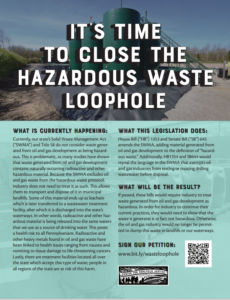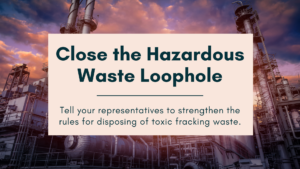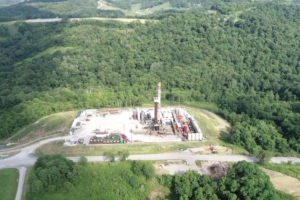Archive: Closing Haz Loophole
Per the Air Pollution Control Act, operations that emit major sources of air pollution are required to obtain, and operate in compliance with an operating permit. In Pennsylvania, these permits are known as Title V Permits. Each permit lays out what kind of pollution is being emitted, how much, and what steps the operator is taking to reduce air pollution. When an operator applies for a new or renewed application, the DEP allows for a 30-day public comment period.
Read MoreTed Auch, FracTracker Alliance, 2015. There is a long history of regulating “road dumping” which, essentially, is the disposal of oil and gas wastewater onto public roads. Due to some legislative loopholes, the by-product from conventional and unconventional drilling was legally allowed to be released on public roads, despite the number and concentration of harmful […]
Read MoreUnder current PA law, oil and gas waste is not classified as hazardous, although it contains radioactive and other dangerous materials. This waste is allowed to be disposed of in our local landfills. Eventually, some of this waste makes its way into our streams and rivers, posing a health risk to all Pennsylvanians. CCJ has […]
Read MoreBecause of a shortsighted exemption made 30 years ago, Pennsylvanians are exposed daily to potentially toxic and radioactive waste produced by the oil and gas industry. For the last three decades, these companies have taken advantage of a loophole in state laws governing the disposal of toxic drilling waste.
Read MoreLast week, the NRDC released a comprehensive report highlighting the gaps in our federal and state laws concerning how radioactive waste, generated from oil and gas development, gets into our water and air. The report, which is aptly titled: A Hot Fracking Mess: How Weak Regulations of Oil and Gas Production Leads to Radioactive Waste […]
Read MoreToday, State Representative Sara Innamorato (D-Allegheny) and Senator Katie Muth (D-Berks, Chester, Montgomery) have reintroduced legislation to protect public health by closing a 30-year-old loophole in state laws governing the disposal of toxic drilling waste.
Read More




